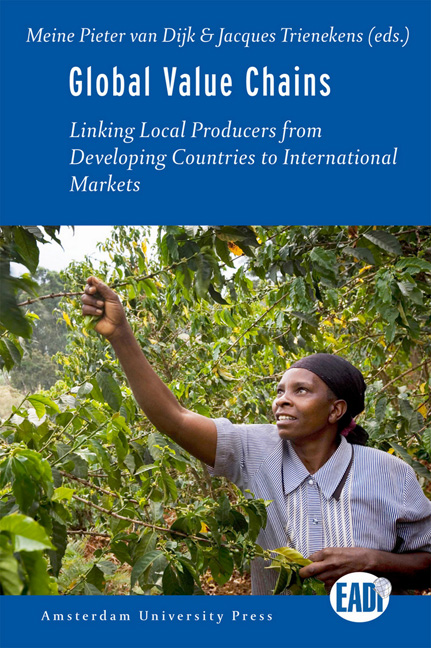Book contents
- Frontmatter
- Contents
- Part I Theoretical Contributions
- Part II Local Agricultural Value Chains
- Part III International Agricultural Value Chains
- Part IV Value Chains in the Industrial and Services Sector
- Part V Conclusions: Upgrading Value Chains in Developing Countries
- About the Authors
- Index
- Miscellaneous Endmatter
3 - Value Chains in Developing Countries: A Framework for Analysis
- Frontmatter
- Contents
- Part I Theoretical Contributions
- Part II Local Agricultural Value Chains
- Part III International Agricultural Value Chains
- Part IV Value Chains in the Industrial and Services Sector
- Part V Conclusions: Upgrading Value Chains in Developing Countries
- About the Authors
- Index
- Miscellaneous Endmatter
Summary
Introduction
Chapters 1 and 2 of this book defined key issues for policy and research on developingcountry value chains. Globalization and expanding international markets as well as the fast growing middle- and high-income class in many developing countries offer opportunities for developing-country producers to operate in emerging regional, national and international markets. However, important barriers for these producers are the lack of an enabling environment offering institutional and infrastructural support, availability of resources and efficient and effective coordination in value chains. In particular small-scale producers in developing countries are in a disadvantageous position because they have little capital to invest, use traditional techniques, depend on family labor and lack contact with (international) market players. These BoP producers must upgrade to get access to modern markets and improve their position.
Figure 1 depicts two key perspectives on developing-country value chains: the vertical perspective where we focus on the role of multinational companies and companies operating on the national market, and their relation to smallholders (BoP producers), and the horizontal perspective including attention to collaboration between producers in, for example, cooperatives, multi-actor networks where private and public partners interact and (regional) industry clusters.
In the last decades globalization has been characterized by falling barriers on international trade due to the decrease of tariffs and lowering of price support and export subsidies, the emergence of global value chains and increasing concentration and consolidation in various links of these chains. These developments have turned many multinational companies (MNCs) into global players in the sourcing and distribution of products and has at the same time resulted in the emergence of new players in the national markets of many developing countries. However, unequal power relationships in these chains and trade barriers impact on the distribution of costs and benefits over the chain participants, keeping the high value-adding activities in Western countries. Developing-country producers struggle to strengthen their bargaining position in these chains, by horizontal collaboration between producers, by setting up alliances in sector-wide networks or through the development of regional clusters, in many cases supported by the state, and bringing about new opportunities for various actors and improvements of the competitive position of a region or country.
Information
- Type
- Chapter
- Information
- Global Value ChainsLinking Local Producers from Developing Countries to International Markets, pp. 43 - 68Publisher: Amsterdam University PressPrint publication year: 2012
Accessibility standard: Unknown
Why this information is here
This section outlines the accessibility features of this content - including support for screen readers, full keyboard navigation and high-contrast display options. This may not be relevant for you.Accessibility Information
- 5
- Cited by
